We left Colin Sturgess in Part One telling us about his time as a teenager racing in the Commonwealth Games and in the Olympics, and turning pro for the Belgian team ADR.
In Part Two here we chat with Colin about his time with the top pro team Tulip Computers, his feelings about the emergence of the peloton’s use of EPO, fighting his way back into the highest levels of world pursuiting, his retirement and emigration, and his subsequent comeback with a number of British squads in the 90’s.
Tell us about the mechanical side of your pursuiting.
“Gearing is an aspect that has changed greatly over the years, and is again something I should have looked into and experimented with a great deal more. I would ride anything from 87″ to 91” and would rarely ‘spin-out.’
“I put my ‘leg-speed’ down to hours and hours of interval training on rollers, coupled with motor-pacing on the road for a bit of strength and power. Ask riders like Dean Downing (and Russ) about the rollers and the visualisation aspect.
“It’s something I used to practice myself and tried to instil into younger riders too. As for design aspect of my bike, to be honest I didn’t have great deal of input!
“I knew roughly what I wanted, what was available at the time, and as long as the bike handled well, was aerodynamic I was very happy. Harry and Peter Quinn were magic; very patient, very knowledgeable, and very generous. I think the only time our opinions differed was in 1991 when I wanted a plain matt-black frame!”
[vsw id=”JAKp6nAdshE” source=”youtube” width=”615″ height=”450″ autoplay=”no”]
It was a more professional a setup at Tulip than at ADR?
“Yes, the entire organisation was more pro there, and a lot more Dutch!
“No empty promises, no bullshit. This is what we expect of you; this is what we’ll pay you; this is how we’ll help you get there.
“With Al Peiper on board as team-captain the morale after the 1990 debacle was sky high.
“With the addition of Peters, Van der Poel, Roosen we had leaders to ride for once again. The bikes and equipment were top notch, we all got more kit than you could poke a stick at; just as a pro team should be.”
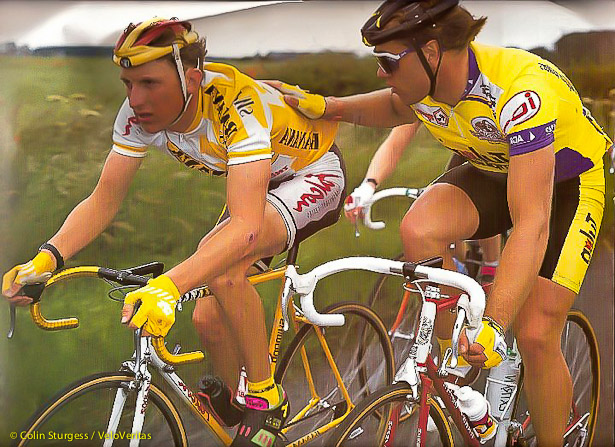
British road race champion in 1990 – tell us about that.
“1990 was a difficult year for me in as much that ADR folded and left those on two year contracts with a second rate set-up. Because I had won the Worlds I was in demand to ride more races on the road and didn’t get enough time to prep for the track – also, I was improving leaps and bounds on the road anyway.
“When I came back to UK for the Nationals I set myself a target of a medal, as that would secure FICP points and in turn a start in better races later in the year. As it turned out the day was perfect for me; rainy, windy, flat – just like back in Belgium!
“I had a couple of early digs to stretch the legs, felt good, and thought I might have a good chance. The biggest issue was riding against the might of the UK teams who had strength in numbers.
“Harry Lodge and I decided that once we’d established a decent break we’d not chase each other down. Come the final, Harry was away; Ben Luckwell jumped after him – I countered Ben (silver) once he’d caught Harry (bronze).”
No title defence in 1990?
“No, unfortunately no results as defending champ in Japan!
“I was fifth or sixth in the pursuit, and about the same in the points-race – I was gutted. But I was under-prepared track-wise.
“Then of course the reverse was true of the road; I was fine for half-way and then ran out of legs.
“Also 1990 was – controversially speaking – the start of the EPO years. Yeah, it’d been around for ages but it was becoming readily available and more widely used, and I wasn’t in the frame of mind to jump on that bandwagon.
“I had my ‘offers’ from certain dubious contacts, but I’d won races on both road and track without doping, so I saw no need (or desire) to do so. I certainly could have done with the money that more results would have brought – but at what cost?
“I don’t ‘blame’ team-mates and rivals that doped, it’s their decision, but personally I would have struggled morally and ethically.”
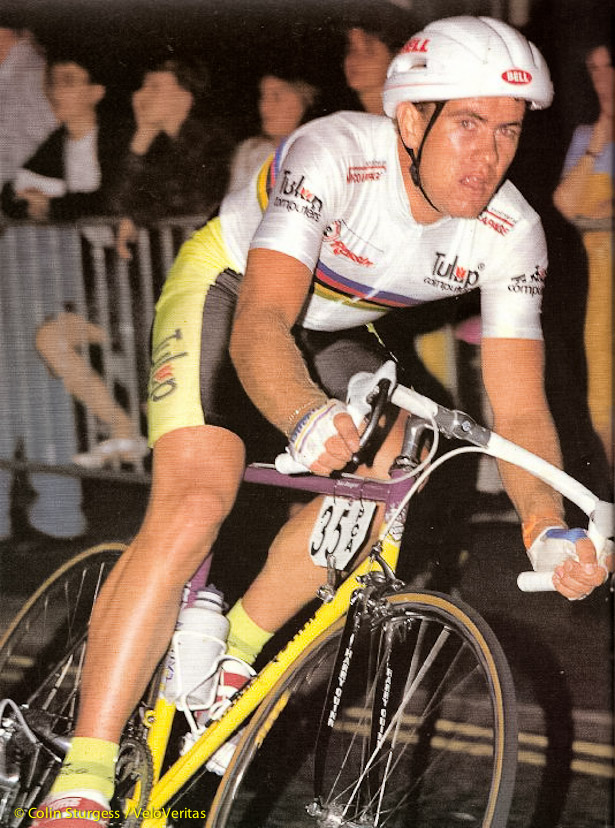
You were back on the Worlds podium in 1991.
“The 1991 Worlds was a strange one.
“I was told by a certain soigneur before the Worlds that his ‘protege’ was going to win, and I had no chance. I knew what he meant, and after the finals he came up to me and said in a roundabout manner: ‘told you so – that should have been you!’
“I finished a decent third but blew the semi-finals against Wallace.
“Yeah, I could have won – If I’d pumped myself full of gear, but it would have been a hollow victory. I rode the road-race too, but as in 1990 I struggled with the distance after being on the track.
“Soren Lilholt and I made a ‘suicide’ attack after about 100kms, took a few with us, but we got brought back pretty quickly!”
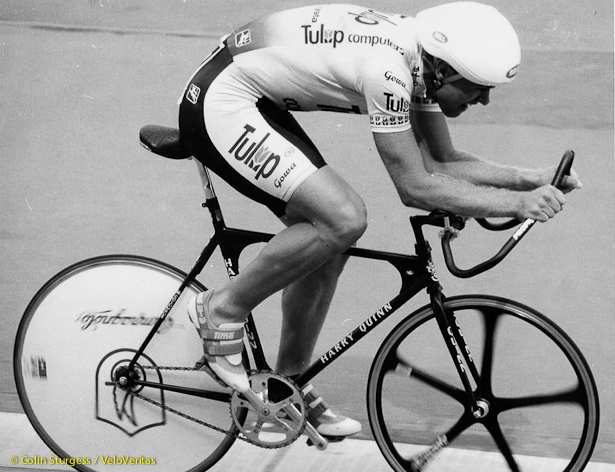
And then it was 1992.
“After the Worlds I realised I wasn’t in the running for a contract with Tulip for 1992.
“I rode well, got good placings, wore a couple of jerseys in short tours but no wins. I started asking around but contracts were in short supply and UK riders weren’t high on DS’s lists at the time.
“It looked for a while that I’d be going to the USA with Subaru Montgomery, but at the eleventh hour that went pear-shaped. I had the choice of riding as an unsponsored pro in the UK or taking a punt on a small contract in South Africa – I chose SA.”
Premier Milling?
“Premier Milling was one of four or five SA pro teams. In those days teams were based on five or six riders only, and were pretty much based in SA only.
“All teams had a mixture of road and track riders and the racing was hard fought between the small base of riders and teams.
“To put it bluntly I had some difficulty with salary and bikes, and really wasn’t enjoying the style of racing (quite negative) so I quit the team, came back to the UK rode a couple of races and decided enough was enough.
“I was only 22 years-old and was owed money left, right, and centre.
“Disillusioned, I called it a day, applied for a couple of University degree courses, and spent the next three years in the student life-style.”
But you mentored David George, the South African pro who won a medal in the U23 Worlds TT ?
“Dave and I became friends when he was over in the UK and I gave him some coaching and help where I could. He had immense talent, but just lacked a little something.
“It’s very difficult being away from home as a young rider and I truly feel if Dave had been UK based he’d have been a very successful professional.
“I taught him what I could and I think (and hope) he was a better rider for it.”
Australia?
“After finishing my degree (Literature, at Loughborough University) my Australian partner and I moved to Sydney. She had a good job lined up and I was happy to make a new start.
“I had no real idea what to do, except that I wanted to do something with journalism.
“I’d done a bit of writing for Cycling, and The Leicester Mercury so I hoped to land something. I worked in the bike industry over in Sydney for a while; then out of the blue got asked to do a bike review.
“One review became two or three, which in turn led to more writing.
“My Editor at the time (Rob Arnold, now owner of Ride Cycling Review) was being given a terrible time at the publishing house we worked for and decided to leave.
“I was approached to take over, which I did – at the time the house was taken over by Emap. So I stayed on as Editor.”
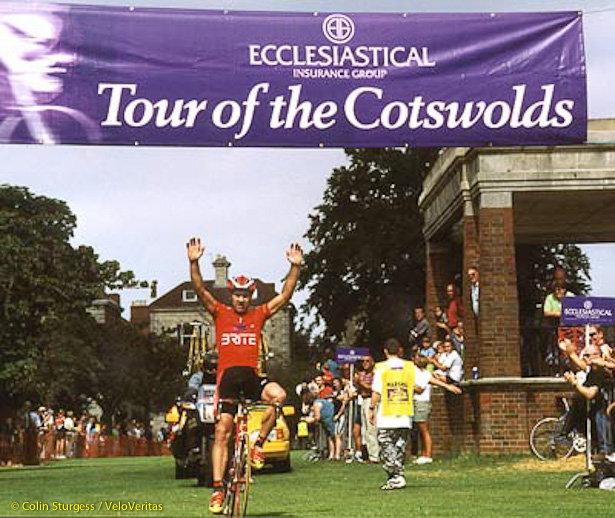
Comeback!
“I never really meant to make a come-back at all! I was enjoying riding bikes for reviews, and loving mountain-biking.
“I got talked into a MTB race and finished second to a national squad rider. From there I was quite keen to have a few more races off-road, which I did and placed pretty well before I contracted Glandular Fever. That knocked me for six.
“I stopped the mountain biking, but carried on pottering and reviewing bikes.
“I covered the track Worlds in Perth in 1997 and borrowed Dave George’s BT Superbike for a review, half jokingly betting I could ride a 4km faster than some of the non-qualifiers.
“I did, much to my surprise – 4:40 with no training.
“When I got back to Sydney I started riding on the track with Garry Sutton’s NSWIS team and made the selection for the Aus nationals.
“We had a great squad: Graham Brown, Steve Wooldridge, Ben Brooks, Brent Dawson, me, Sean Eadie, Ben and Josh Kersten and a young Mark Renshaw.”
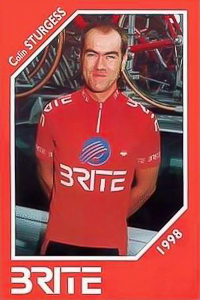
Silver with England in the Commonwealth Games team pursuit in 1998 – that must have been satisfying ?
“Silver in the TP was a great result!
“I was really chuffed, but I am sure we could have had the gold if we hadn’t had a mechanical in the first round. That got us a harder ride against NZ and we weren’t as fresh for the final as the Aussie boys.
“Still, we rode them hard, and I think it gave us confidence for future years.
“I also rode scratch and points as ‘domestique’ for Wallace and Hayles, and they both silver-medalled so my job was done.”
Team Brite?
“Team Brite was great! Probably one of the best set-ups and teams I ever rode for.
“Good management, paid well and on time, excellent kit, and great team-mates. Can’t ask for much more really.
“We had amazing results in 1998 both domestic and international; road and track. I finished fourth in just about every bloody national title you can mention, so I missed out on a medal.
“But winning the Cotswolds and breaking the national record for the team pursuit at the Bordeaux Worlds made up for it.
“I was really upset when we found out that the team wouldn’t continue into 1999 and beyond.”
Mens’ Health?
“Ahhh! Men’s Health…
“Big hopes – nothing doing.
“I was ‘fortunate’ in many ways to miss most of the season due to spinal injury, and was released to go back to Aus after my operation.
“On paper the team was looking very good indeed; some youth, some experience – but lots of promises and no delivery.
“It was kind of sad, because it’s people’s livelihoods being screwed with and many of those riders never rode to their full potential because of it.”
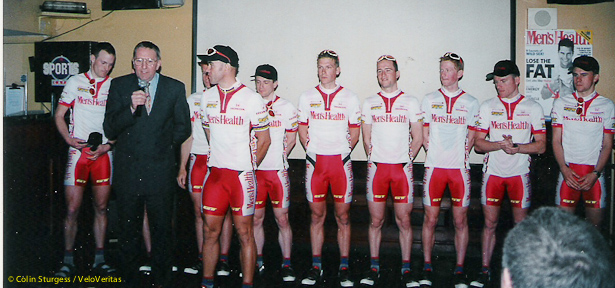
Australian coach, Charlie Walsh gave you the chance to ride for his team – why not take it?
“I felt I owed the GB squad for giving me a chance in ’98, and to be honest, a couple of ex-Australian Institute of Sport riders warned me off.
“They said, probably rightly so, that the AIS would use older riders such as me to gain qualification and then dump us come Olympic selection time.
“It’s quite well known in Aus that that had happened on numerous occasions and I wasn’t prepared to gamble and miss out on the Games.”
Why quit, again?
“The hardest decision of my life and one that I still regret but can’t change!
“At the time of GB selection six riders were named, I was one of them.
“Due to the ‘set-up’ at the time I wasn’t being paid the same as the rest of the riders and didn’t think it fair.
“There was a lot of ‘politics’ at work behind the scenes, and I felt more emphasis was being put on riding ‘selection’ times rather than looking forward to the event a few months ahead.
“Both Matt Illingworth and I regret not getting a medal, but I stuck by my principles.”
Life now?
“Life these days has, to be utterly frank, gone to shit!
“I was working as a wine-maker and wine-educator in the Hunter Valley (just north of Sydney) for years, but recently my second marriage went ‘tits-up’, I lost my job, my house, pretty much everything.
“I was living rough; trying to deal with a relationship break-down, trying to deal with being bi-polar, trying to get myself together – but to no avail.
“My parents bought me a flight back to the UK (where I am for the next few months) to give me a chance to get back on my feet.
“At present I’m getting myself back together with help from family and friends.
“I’ve learned who my true friends are this last year, that for sure!”



